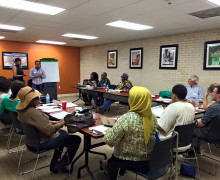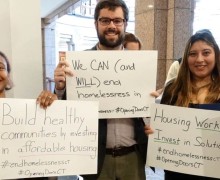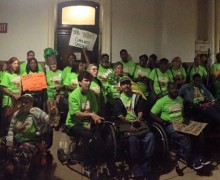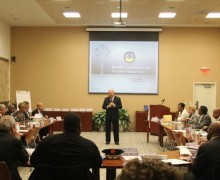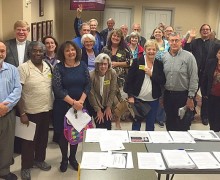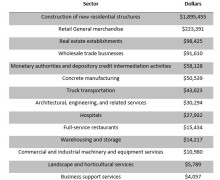Philadelphia Advocates: Double Revenue to PHTF to Mitigate Gentrification

Responding to pressure from housing and community advocates to address the rising housing costs that are jeopardizing many Philadelphia neighborhoods, the Philadelphia City Council is evaluating potential new sources of revenue for the Philadelphia Housing Trust Fund (PHTF). At hearings in the spring, advocates suggested the City look at funding sources such as the growth in property tax revenue from expiring tax abatements, the growth in the revenue of the current Realty Transfer Tax, 1.5 % Realty Transfer Tax Increase (“anti-speculation” tax), and a development linkage fee. A City Council Affordable Housing Working Group is now evaluating these and other ideas.
Like many major cities in the United States, Philadelphia is becoming an increasingly popular place to live. After years of declining population and disinvestment in neighborhoods, there has been new development and investment in many neighborhood that have resulted in a steady rise in cost of living and property values. For many people who live in Philadelphia, which has large populations of families with children, people with disabilities, and seniors with incomes at or below the poverty line, this new found prosperity is putting many long-time community members, including a disproportionately high number of African Americans (see p. 6), at risk of displacement. At the same time, other low-income neighborhoods continue to face a lack of new investment and opportunity.
Since 2005, the PHTF has raised more than $113 million assisted more than 20,000 households through the production of new homes, preservation and repair of existing homes, home modifications for persons with disabilities, and homelessness prevention programs. Though a proven tool to provide the housing Philadelphia needs, the demand for PHTF funds consistently exceeds the available resources, which has recently averaged $12-$13 million annually. With the rising cost of housing in Philadelphia neighborhoods already having an impact on families and long-time neighbors, and exacerbating the shortfall of available funds, the urgency to act spurred both the Philadelphia Association of Community Development Corporations (PACDC) and Philadelphia Coalition for Affordable Communities to launch advocacy initiatives directed at building political will on City Council and the new incoming Mayoral Administration.
PACDC is a trade association with 115 member organizations involved in affordable housing and community development. PACDC is dedicated to advocacy, policy development and technical assistance for community development corporations and other organizations in their efforts to rebuild communities and revitalize neighborhoods. PACDC led successful campaigns to dedicate and increase revenue for the PHTF in 2006 and 2012.
The Philadelphia Coalition for Affordable Communities is a coalition of 42 community, faith, and labor organizations that launched a Development without Displacement campaign in September 2014 to expand the PHTF and protect affordability in neighborhoods undergoing gentrification. Members of the Philadelphia Coalition for Affordable Communities were part of the organizing and advocacy campaign to win the original PHTF in 2005. The goal of the Development Without Displacement campaign is to preserve affordability in gentrifying neighborhoods so that those who are committed and invested in those communities can afford to stay, and to advance public policy that encourages equitable community development, meaning plans that include people of all income levels in the future of their neighborhoods.
PACDC and the Philadelphia Coalition for Affordable Communities each issued policy platforms in early 2015. PACDC’s platform, Beyond Gentrification: Toward Equitable Neighborhoods, cites the city’s historic residential segregation and pattern of neighborhood disinvestment in many areas of the city where African Americans, Latinos, immigrants and poor white people live. The Platform calls for a pro-growth strategy that confronts structural and institutional forms of inequality by creating sustained equality in housing, health, education and economic opportunity for low- and moderate-income households and institutions by ensuring they:
- Have influence over decision making that shapes their neighborhood inclusively;
- Benefit from improved neighborhood conditions;
- Have access to community resources and services that improve their quality of life and fulfill their basic needs close to where they live;
- Have choices about where to live and work;
- Are not involuntarily displaced from their neighborhood of choice.
Beyond Gentrification: Toward Equitable Neighborhoods calls for doubling the dedicated revenue is the PHTF to at least $25 million annually as part of the platform’s plan to create and preserve quality, affordable home choices in every part of the city.
The Philadelphia Coalition for Affordable Communities platform, Development Without Displacement: Keep Communities Strong, with a research-based analysis focused on neighborhoods in North, West and South Philadelphia, shows that housing costs have increased as much as 200% from 2000-2012. To address the destabilizing impact of gentrification, the platform calls on the city government to act to curb the displacement by adopting public policy that encourages equitable development inclusive of all of community members.
“As a coalition of people who are most directly impacted by the affordable, accessible housing crisis, and without enough access to green space, we know that the time for action is now,” says Nora Lichtash, Executive Director of the Women’s Community Revitalization Project, and Steering Committee member of the Philadelphia Coalition for Affordable Communities. “We believe that market rate development is needed in Philly—we need it so that our tax base increases and we can afford to fund our schools and other city services. But there is no question that gentrification and unchecked development causes displacement.”
A recommended first step is for City Council to pass legislation that requires developers who buy and sell houses within two years to pay an anti-speculation fee, a 1.5% increase to the Realty Transfer Tax, which would generate an estimated $12 million annually. The platforms calls on City Council to explore other revenue sources and progressive policy opportunities to sustain affordability and grow access to affordable, accessible housing and green space.
By March 2015, key members of City Council, and their staff, including the Council President’s office, and the Chair and Vice-Chair of the Committee on Housing, Neighborhood Development and the Homeless, committed to holding a series of City Council briefings and hearings around affordable housing– a follow up to a resolution introduced nine months previously by the Chair of the Housing Committee to hold hearings on expanding funding for affordable housing. In late March and April the City Council received a briefing and held public hearings first on housing need and then potential solutions. As result of the springtime briefings and hearings, by mid-summer, the City Council established three committees to explore and identify potential sources of revenue that could be dedicated to the PHTF: Reallocation of existing resources, non-cash/ regulatory options, and new revenue sources. Each committee is expected to issue a report on their findings to City Council. Members of both the Philadelphia Coalition for Affordable Communities and PACDC testified at the hearings and were appointed to the committees to dig deeper into potential solutions.
Meanwhile, the Philadelphia Coalition for Affordable Communities was working on an electoral strategy for the May 2015 city council primary that involved participation in the majority of scheduled candidate forums- asking direct questions about the Housing Trust Fund to City Council and Mayoral Candidates as well as coalition member education about the importance of the election. In April, PACDC held a Mayoral Candidates forum on equitable development as well as an Open House for City Council candidates, where candidates articulated their support for many of the recommendations in the Equitable Development platform, including expanding funding for the PHTF.
After the elections the Philadelphia Coalition for Affordable Communities kept working to build the power of their coalition by engaging new organizations and reaching out to citizens to get their support for expanded resources for the PHTF. On September 10, 2015, the first day of the 2015-16 year for the Philadelphia City Council, the Philadelphia Coalition for Affordable Communities delivered 2,000 petition signatures to City Council demanding that they take action to grow the PHTF. In addition, more than 100 coalition members filled Council chambers wearing coalition shirts, carrying signs, and some dressed in vegetable costumes (to illustrate the importance of access to healthy food) to call on Council members directly to take action to expand affordable, accessible housing and green space. This action directly resulted in meetings with Council members to discuss funding sources for the PHTF. The Philadelphia Coalition for Affordable Communities is continuing its work with Council to pass a package of bills to expand the PHTF.
The City Council’s three committees are currently working to finalize their recommendations and report findings to City Council leadership and the incoming Mayoral Administration before the end of the year, with the expectation that legislation will be introduced in early 2016 once the new City Council and Mayoral Administration take office.
“Given the dramatic rise in housing costs in Philadelphia and the long waiting lists for affordable homes and home repair programs, as a City we cannot afford not to make a greater local investment in expanding affordable housing opportunities. Other cities such as Washington DC have shown us that it can be done”, said Rick Sauer, Executive Director of PACDC.
For more information, contact Rick Sauer, PACDC, Rsauer@pacdc.org or Christi Clark, Philadelphia Coalition for Affordable Communities, cclark@wcrpphila.org.



